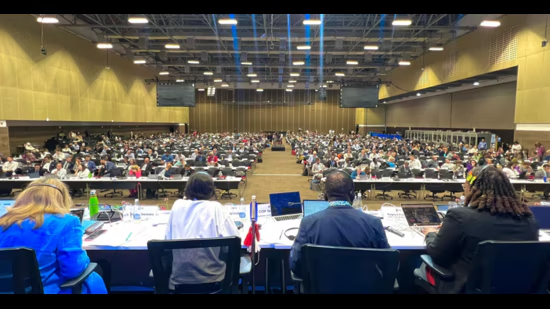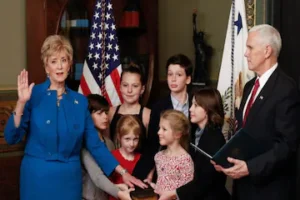Cali COP16 takeaways: Pharma, cosmetic, biotech giants to pay share of profits

The objective of the Cali Fund is to provide financial support for biodiversity preservation efforts, with a particular focus on recognizing and supporting frontline defenders of biodiversity, including indigenous communities and forest inhabitants.
During the recent annual negotiations of the Convention on Biological Diversity (COP16) in Cali, Colombia, it was decided that industries such as big pharma, cosmetics, nutraceuticals, and biotechnology utilizing digital sequence information (DSI) from genetic resources must contribute a small portion of their profits towards global biodiversity conservation efforts. This directive marks a significant step towards promoting environmental sustainability and resource conservation.
The Cali discussions had to be halted when numerous delegates departed on the expected conclusion day. Nevertheless, the agreement on implementing a multilateral benefit-sharing system for utilizing DSI and setting up the Cali Fund was successfully reached.
Compensation required from corporations for access to digital information
The primary goal of the Cali Fund is to provide financial support for the preservation of biodiversity and to recognize and incentivize individuals like indigenous communities and forest inhabitants who actively safeguard biodiversity. The initiative emphasizes the significance of digital sequence data related to genetic resources and advocates for its transparent availability. It underscores the necessity of just and equal distribution of advantages stemming from the utilization of digital sequence data on genetic resources in aligning with Goal 13 of the Kunming-Montreal Global Biodiversity Framework.
Target 13, one of the 23 global biodiversity targets, emphasizes the enhancement of fair benefit distribution derived from the utilization of biological resources, serving as a fundamental element within the framework.
Continuation of access and benefit sharing from biological resources will be in accordance with the national laws.
The Biological Diversity (Amendment) Act of 2023 in India deals with the aspect of access and benefit sharing. In a notable change, the amendment excludes AYUSH practitioners and individuals utilizing traditional knowledge from the obligation to share benefits with local communities. Furthermore, the amendment replaces criminal charges with monetary fines for all infractions within the Ayush sector.
The agreement by the Cali Fund stipulates that entities utilizing DSI on genetic resources in industries that derive benefits, either directly or indirectly, from such usage in their business operations, are required to allocate a percentage of their earnings or income to the international fund based on their scale.
According to the agreement, companies that surpass at least two of the following criteria on their balance sheet dates (total assets: $20 million, sales: $50 million, profit: $5 million) averaged over the previous three years, are expected to allocate 1% of their profits or 0.1% of their revenue to the global fund as a suggested rate.
Funding distribution will depend on the capacity requirements aimed at conserving and sustainably utilizing biodiversity. Priority will be given to least developed nations, small island developing states, transitioning economies, as well as indigenous groups and local communities. The richness of biodiversity will also play a significant role in the allocation process.
The agreement stated that equitable sharing of non-monetary benefits, such as capacity building for DSI generation, should be practiced among all users of DSI on genetic resources.
The World Wide Fund for Nature announced on Sunday that although the disbursement specifics are still under discussion, a decision has been made to assign 50% of the fund to Indigenous peoples and local communities. This allocation will empower these communities, including women and youth, to benefit from the profits, either through direct channels or government intermediaries.
Mother Earth is recognized as the rightful owner of all-natural genetic information in certain perspectives, as emphasized in the text on DSI.
Kirsten Schuijt, the director general of WWF International, expressed that despite its imperfections and the need for further refinement, the newly established Cali Fund represents a significant advancement. She highlighted that it mandates equitable contributions to biodiversity conservation from businesses benefiting from nature and channels essential financial support to the most deserving communities and regions.
Kanchi Kohli, an independent legal and policy researcher, highlighted the complex nature of fairness and equity benefit-sharing agreements when it comes to regulating access to biological resources and knowledge. She emphasized the need for a balanced approach that not only facilitates access but also ensures fair benefit-sharing. While acknowledging the significance of Digital Sequence Information (DSI) in this context, Kohli cautioned that it could potentially limit discussions on Access and Benefit Sharing (ABS) to a narrow scope involving DSI providers, national authorities, and users. To address this concern, she proposed the establishment of an institutionalized framework that prioritizes the role of original knowledge holders and community-based conservation efforts. Kohli suggested that a similar approach should guide the processes of funding collection and distribution to uphold the principles of fairness and equity.
Forest communities play a significant role in environmental conservation.
An essential result of COP16 is the consensus reached on enhancing the involvement of Indigenous groups and forest-dwelling communities in biodiversity conservation efforts. The International Institute for Sustainable Development (IISD), a renowned think tank, highlighted this significant development in its COP16 summary. Participants marked a historic occasion by applauding the establishment of a subsidiary body dedicated to Article 8(j) of the Convention, focusing on Indigenous Peoples and Local Communities. Additionally, there was recognition of the role of individuals of African descent in executing the Convention, signifying a pivotal moment during the conference.
COP16 also included a ministerial meeting focusing on “Harmony with the Environment”.
According to the IISD Earth Negotiation Bulletin, many participants highlighted the connection between resource scarcity and conflict, stressing the importance of taking corrective measures to coexist harmoniously with nature. They pointed out that effective biodiversity conservation is feasible only in a tranquil setting and that peace is dependent on a thriving planet. Moreover, they emphasized the significance of a sound environment for ensuring food security and adequate nutrition, both of which are fundamental requirements for peace.
Misses of considerable magnitude
COP16 aimed to advance the implementation of the Kunming-Montreal Global Biodiversity Framework, focusing on crucial goals like safeguarding a minimum of 30% of biodiverse terrestrial and marine regions by 2030. To facilitate this, a proposal was tabled regarding resource mobilization through the creation of a specialized global funding mechanism for biodiversity conservation. Regrettably, developed nations rejected this proposal, as reported by IISD. Additionally, COP16 did not succeed in endorsing a plan to generate $200 billion annually by 2030 for the execution of the Global Biodiversity Framework.
Developed nations are falling short on their pledges to deliver $20 billion per year in global biodiversity funding by 2025. Additionally, contributions to the Global Biodiversity Framework Fund in Cali have been minimal, with the fund amounting to just $407 million, according to WWF.














